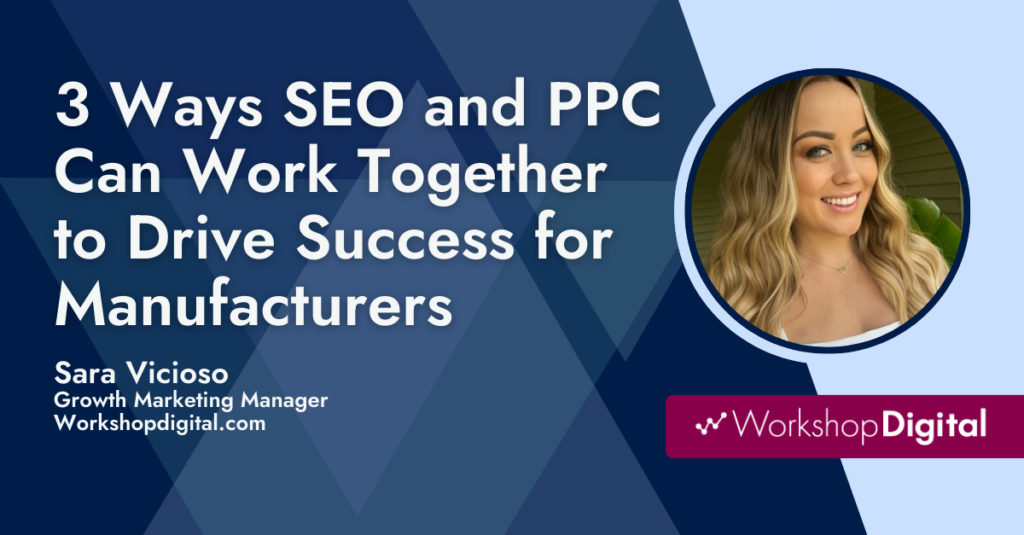
In the competitive manufacturing industry, standing out requires strategic marketing approaches that increase online visibility and drive high-quality leads. Search Engine Optimization (SEO) and Paid Search (PPC) advertising are two powerful tools that manufacturers can leverage. When used together, these channels create a synergy that can increase traffic, visibility, and conversions.
Similarities Between SEO and PPC
PPC and SEO share several core goals and functions, making them complementary to each other.
- Keyword Optimization: Both strategies depend on identifying and targeting the right keywords to reach an engaged audience. In manufacturing, this could be focusing on terms like “automated assembly machines” or “robotic palletizing systems”.
- Improved Visibility: Both aim to enhance visibility in search engine results. SEO secures organic rankings, while PPC guarantees prominent paid placements.
- Traffic Generation: Both methods aim to increase website traffic by targeting industrial buyers searching for specific products or services.
- User Intent Targeting: PPC and SEO both prioritize addressing user intent. This is crucial for manufacturers targeting decision-makers at various points in the purchasing process.
Differences Between SEO and PPC
While they share similarities, PPC and SEO differ in execution, timeline, and results. These differences highlight their strengths and how they can complement each other.
- Cost Structure: PPC involves a pay model where you pay for action taken and requires
ongoing budget allocation. Whereas SEO relies on organic efforts such as content creation, link building, and ongoing website optimization. This in return, takes time and resources to achieve and maintain results. - Timeline: PPC provides immediate results whereas SEO is a long-term strategy that requires patience to build authority.
- Placement: PPC ads appear at the top or bottom of search results whereas SEO appears in between.
- Longevity: PPC results last only as long as you maintain your ad budget whereas SEO offers long-term value.
- Testing Capabilities: PPC provides robust testing tools and real-time data, making it ideal for experimenting with keywords, ad copy, and CTAs. For SEO, testing is slower and more iterative, for changes take time to reflect in the search results.
Dominate Search Engine Results Pages (SERPs)
Appearing in both organic and paid search results is a highly effective way for manufacturers to outshine their competitors and capture the attention of industrial buyers. These buyers value trust and accessibility when choosing suppliers, and a dual presence in search results reinforces your authority and credibility. By combining SEO and PPC, your business can command more visibility on the search engine results page, solidifying your position as an industry leader.
Additionally, PPC allows you to protect your brand name in search results, ensuring that competitors don’t outrank you or siphon off potential customers searching specifically for your company. This strategic combination enhances your reputation and protects your market share.
Tip: Use PPC ads to target high-value, competitive keywords while your SEO strategy builds authority and ranks organically for related terms.
Drive Keyword Strategy with PPC Insights
PPC and SEO strategies both rely on keyword optimization to appear in relevant search queries. PPC campaigns offer real-time data on which keywords drive traffic and conversions, providing valuable insights to refine your SEO strategy. By focusing on terms that have proven successful in paid campaigns, you can enhance your organic search performance. Similarly, SEO efforts can uncover opportunities for PPC by identifying high-traffic keywords that aren’t converting as well organically, allowing for more targeted ad campaigns. Together, these strategies create a data-driven feedback loop that optimizes both organic and paid efforts.
Tip: Regularly review PPC reports to identify high-performing keywords and integrate these into your SEO strategy for long-term gains.
Test Copy Through PPC to Enhance Your Website SEO
Using PPC campaigns to test copy is another effective way to refine your website’s content for SEO. PPC allows you to gather real-time data on user behavior, providing insights into which headlines, calls-to-action (CTAs), and messaging resonate most with your target audience. For example, by running A/B tests with different ad copy in PPC campaigns, you can determine the phrasing that drives the highest engagement. Once you identify what works, these insights can be applied to your website’s meta descriptions, page titles, and on-page copy, enhancing your organic search performance.
Tip: Use PPC to test specific value propositions that align with your product offerings. For instance, test if “cost-effective solutions” or “high-performance reliability” resonates better, and implement the winning copy on your website.
SEO and PPC Strategies Are Better Together
For manufacturers, integrating SEO and PPC is a key search strategy that can set you apart from your competitors. By combining immediate PPC data with the long-term benefits of SEO, industrial manufacturers can increase visibility, drive traffic, and convert qualified leads at every stage of the customer’s journey. Whether you’re targeting niche markets or promoting specialized services, SEO and PPC together build a strong search strategy to drive success for your business.
Workshop Digital is a proud sponsor of the Industrial Marketing Summit.
